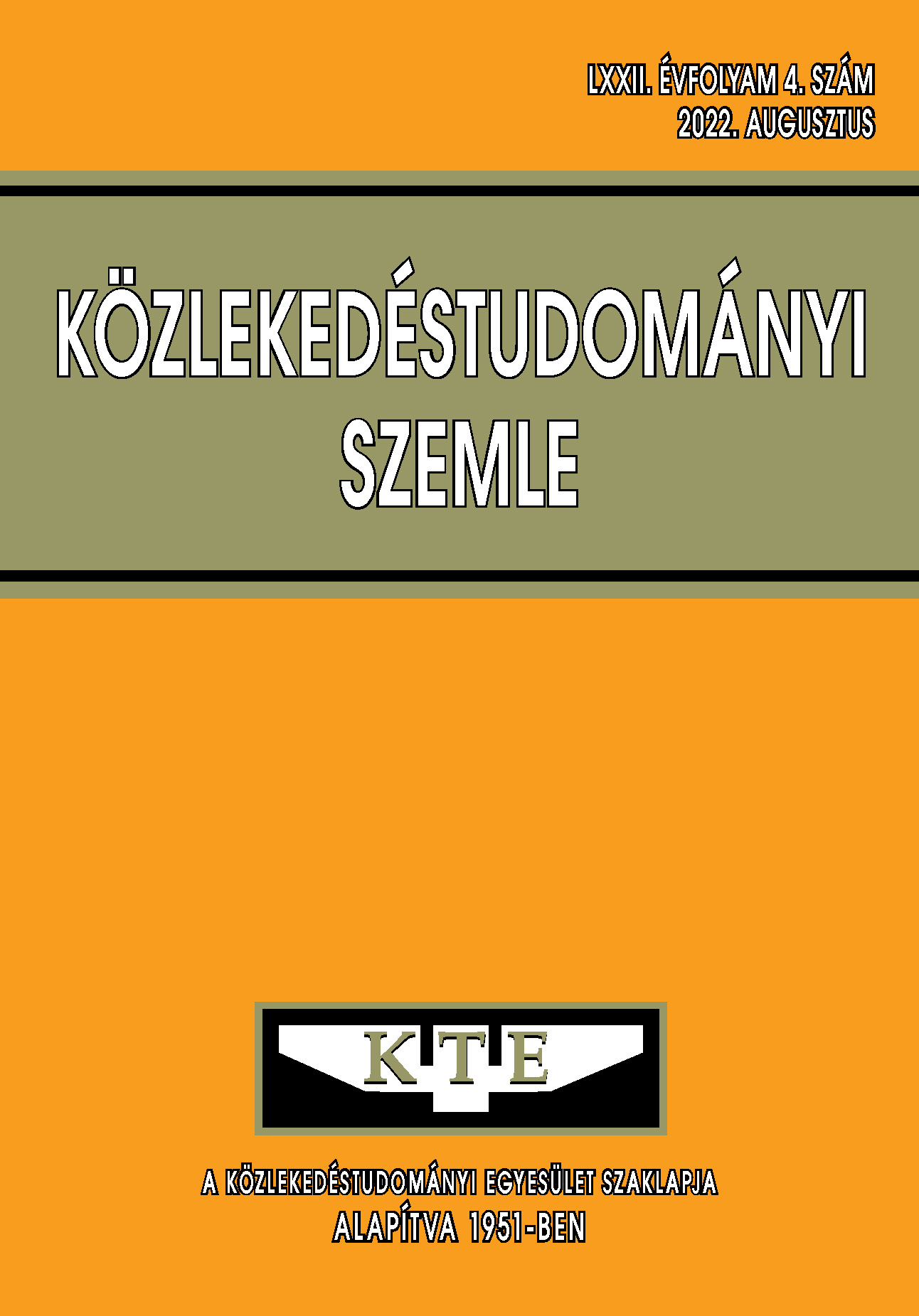Elektromos közúti gépjárművek beszerzését támogató költségszámítási módszer és alkalmazás kidolgozása
Absztrakt
A hagyományos üzemanyaggal működő járműflotta fokozatos lecserélése alternatív energiaforrásokkal működő járművekre jelentős lépés a közlekedési rendszerek fenntartható fejlesztése és a hatékony energiagazdálkodás irányába. A jelenlegi technológiai fejlettség mellett az elektromos közúti gépjárművek széles körű elterjedését többféle intézkedéssel lehet elősegíteni.
Hivatkozások
Bubeck, S. - Tomaschek, J. - Fahl, U. (2016). Perspectives of electric mobility: Total cost of ownership of electric vehicles in Germany. Transport Policy 50: 63–77. DOI: https://doi.org/f83j8h
Buekers, J. - Holderbeke, M. V. - Bierkens, J. - Panis. L. I. (2014) Health and environmental benefits related to electric vehicle introduction in EU countries. Transportation Research Part D: Transport and Environment, 33: 26-38. DOI: https://doi.org/f6sbw8
Bühne, J-A. - Gruschwitz, D. - Hölscher, J. - Klötzke, M. - Kugler, U. - Schimeczek, C. (2015). How to promote electromobility for European car drivers? Obstacles to overcome for a broad market penetration. European Transport Research Review, 7(3). DOI: https://doi.org/f79cxw
Desreveaux, A. - Hittinger, E. - Bouscayrol, A. - Castex, E. - Sirbu, G. M. (2020). Techno-Economic Comparison of Total Cost of Ownership of Electric and Diesel Vehicles. IEEE Access, 8: 195752-195762. DOI: https://doi.org/gm5xm4
Figenbaum, E. - Fearnley, N., et al. (2015). Increasing the competitiveness of e-vehicles in Europe. European Transport Research Review, 7(28). DOI: https://doi.org/f79dw3
ICCT: the international council on clean transportation (2016). Comparison of leading electric vehicle policy and deployment in Europe.URL: https://theicct.org/publications/comparison-leadingelectric-vehicle-policy-and-deploymenteurope Letöltés ideje: 2021.08.18
Kestera, J. - Noel, L. - De Rubens, G. Z. - Sovacool, B. K. (2018). Policy mechanisms to accelerate electric vehicle adoption: A qualitative review from the Nordic region. Renewable and Sustainable Energy Reviews. 94: 719–731. DOI: https://doi.org/gfgbzs
Letmathe, P. - Suares, M. (2020). Understanding the impact that potential driving bans on conventional vehicles and the total cost of ownership have on electric vehicle choice in Germany.
Sustainable Futures 2: 100018 DOI: https://doi.org/gnbwpx
Mitropoulos L., K. - Prevedouros, P. D. - Kopelias P. (2017). Total cost of ownership and externalities of conventional, hybrid and electric vehicle. Transportation Research Procedia 24C: 267–274. DOI: https://doi.org/gf8t4s
Pauer Gábor. (2015). Az elektromobilitással összefüggő utazói döntéseket támogató módszer és alkalmazás koncepciójának kidolgozása. Diplomaterv, BME
Velzen, A. - Annema, J. A. - Kaa, G. - Wee, B. (2019). Proposing a more comprehensive future total cost of ownership estimation framework for electric vehicles. Energy Policy 129: 1034–1046. DOI: https://doi.org/h3cj
Wood, J. - Jain, A. (2020). Raceways, rebates, and retrofits: an exploration of several American cities’ policies to facilitate electric vehicle purchase and usage. International Journal of Urban Sustainable Development. DOI: https://doi.org/h3ck
Wróblewski, P. - Lewicki W. - Drożdż, W. - Dowejko, J. (2021). Total cost of ownership and its potential consequences for the development of the hydrogen fuel cell powered vehicle market in Poland. Energies 14(8), 2131; DOI: https://doi.org/gmj9f6
Az elektronikusan megjelenő cikkek nyílt hozzáféréssel rendelkeznek (OJS), online ingyenesen elérhetők és letölthetők. A cikkek szerzőit nem terheli megjelentetési vagy kiadási költség (APC). Felhasználóknak joguk van a cikkek olvasására, letöltésére, másolására, kinyomtatására, valamint azokban való keresésre, vagy a teljes szöveg linkkel történő megosztására.
A szerzőknek nyilatkozniuk kell arról, hogy beadványukat korábban nem tették közzé más folyóiratban, a pénzügyi támogatás feltüntetésre került és a hivatkozások listája teljes és pontos, beleértve az URL-ek és a DOI-k specifikációját is (ha rendelkezésre állnak). A cikktervezet beadásakor minden szerző jóváhagyja a benyújtott változatot. A szerzők garantálják, hogy a cikk az ő eredeti művük. A szerzők kötelesek részt venni a szakértői értékelés folyamatában, követni a bírálók tanácsait, betartani az előírt határidőket, és amennyiben előfordulnak, kötelesek visszavonni a benyújtást vagy kijavítani a hibákat.
Minden beadott cikket szakértői értékelés alá kerül, ahol a szerkesztők független értékelést kérnek legalább egy szakértőtől, ügyelve arra, hogy a bíráló(k)nak ne legyen összeférhetetlensége a szerzőkkel. A végső döntést a főszerkesztő hozza meg, aki figyelembe veszi az értékeléseket és a szerkesztők javaslatait. A szerkesztők és a lektorok bizalmasan kezelik a beadványt.
A kiadó és a szerkesztők elkötelezettek a magas etikai normák betartása mellett, és megakadályozzák azokat a publikációkat, amelyekben kutatási visszaélés történt. Az ilyen etikai kérdésekben a COPE irányelveit követik.
A szerzők fenntartják a szerzői jogokat, és megadják a folyóiratnak az első közzétételi jogot a Creative Commons Licenc alapján (https://creativecommons.org/licenses/by-nc-nd/4.0), amely lehetővé teszi mások számára, hogy megosszák a művet, elismerve a mű szerzőségét és a folyóiratban való első közzétételt.
A folyóirat archiválja az összes megjelent cikket, és a folyóirat tulajdonosa, a Közlekedéstudományi Egyesület továbbra is üzemelteti az adatbázist abban az esetben is, ha a folyóirat kiadása megszűnik.















